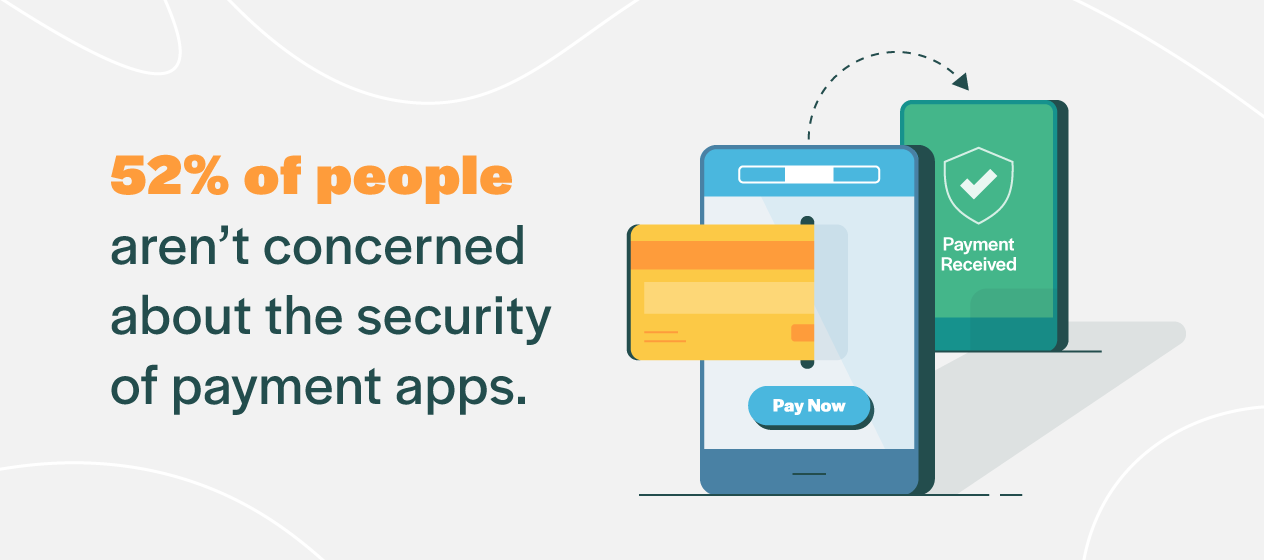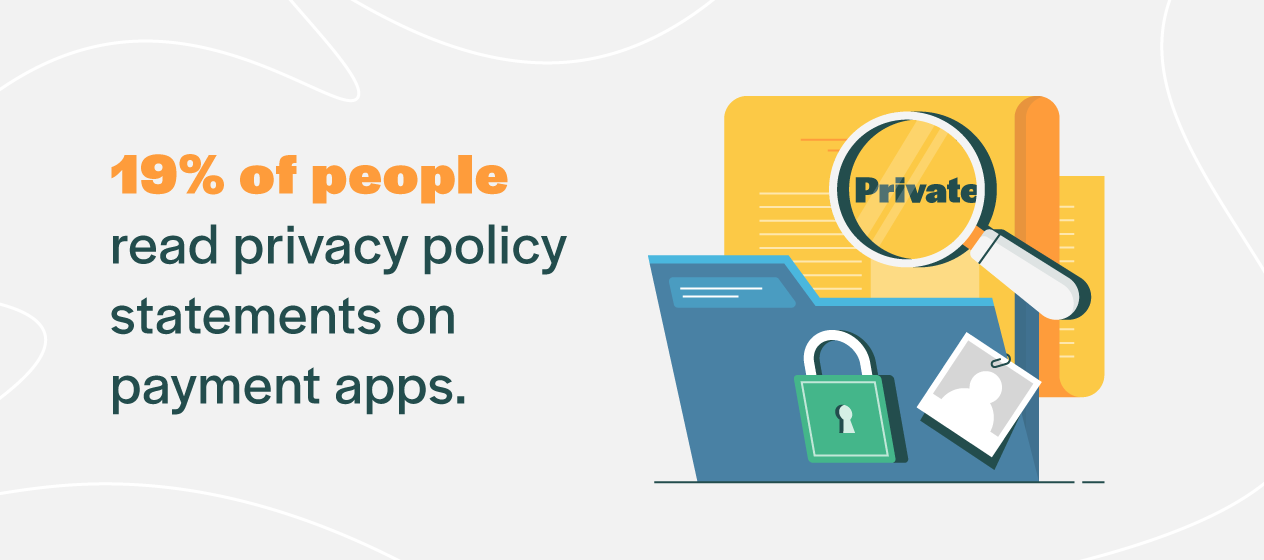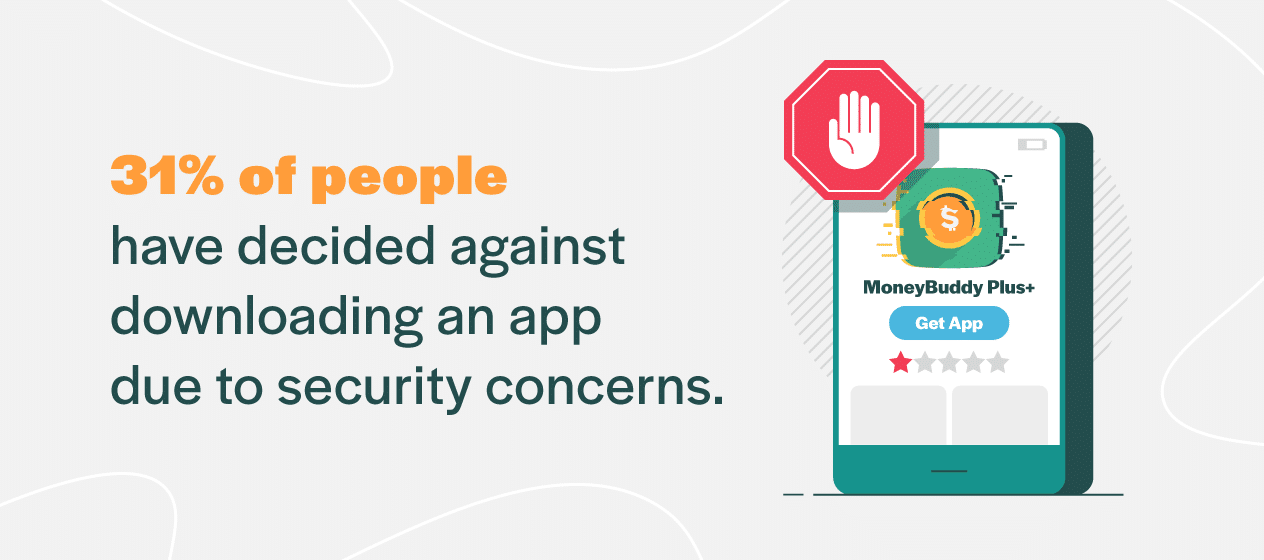moneycrashers.com
Sometimes it doesn’t take long for brands to maneuver their way into our vocabulary. Multimillion-dollar businesses become interchangeable with verbs. How many times have you heard “Google it” or “I’ll Venmo you”?
For many people, that can lead to trust beyond question — even when it means allowing access to one of their most confidential assets: money.
We conducted a survey to find out how Americans perceive payment apps. We found that although 90 million Americans use payment apps, most people aren’t concerned about the security of them.
Some key findings include:
- More than half (52%) of people aren’t concerned with the security of payment apps.
- Only 19% of people read payment apps’ privacy policies.
- Almost one-third (30%) of people have decided against downloading a payment app due to security concerns.
Half of People Aren’t Concerned About Payment App Security
Mobile payment apps have introduced a convenience like no other. If you forget your wallet, paying for your bill is as easy as swiping your smartphone or smartwatch. But while many people have been quick to adopt this new way of payment, not all have looked into what kind of data they’re disclosing by using it.
In fact, our survey found that 52% of respondents weren’t concerned about the security of the payment apps they use.

That’s an incredibly high number, considering person-to-person apps like PayPal, Venmo, and Square are not fraud-proof. In fact, Venmo reported a $40 million loss in fraud reimbursements during the first quarter of 2018 alone.
What’s especially concerning about these numbers is that most payment app scams rely not on complicated platform hacks or malware, but on simple lack of awareness. One common digital wallet scam involves an “accidental payment” followed by a quick “oops” message requesting it be returned. Later, the victim finds out the original payment was made with a stolen card, and the stolen funds will be removed from the victim’s account, not the fraudster’s.
And while 20% of people said they’ve had security concerns, they also said those concerns don’t prevent them from continuing to use these apps.
Few People Read Privacy Policies
A privacy policy statement shares how a company will collect, store, protect, and use the personal data you share with them. Consumers are meant to read them in order to make informed decisions. However, sometimes they’re too difficult to understand, leading people to skim them or skip reading them altogether.

Why is it important to read the privacy policy statements of payment apps? Even more so than other platforms, digital wallets often expose personal information to the public — and that personal information can land you right in the center of a fraudster’s target.
A coder and privacy researcher, Hang Do Thi Duc, dug into the security issues with Venmo, revealing the scary details that anyone can learn through the personal information people share on the app. The text and time stamps of transactions people make create a window to their lives. For example, by examining the transactions of a single food cart vendor, Do Thi Duc was able to identify the vendor’s most frequent patrons, how often they made purchases, and at what time of day they could be expected to visit.
Depending on the context, this information can expose users to everything from marketing schemes to theft, assault, and blackmail.
Security Isn’t Top of Mind When Downloading New Payment Apps
While downloading an app can take mere seconds, the consumer’s decision to download it in the first place can take even less time. We asked consumers if they’ve ever decided against downloading an app due to security concerns, and only 31% said yes.

Almost half (43%) of respondents said they haven’t decided against downloading a payment app due to security reasons, while 26% of people have never considered using payment apps.
Ideally, users should be deciding whether or not to download and use a payment app only after reading the privacy policy and determining that the app is not putting their information security at risk. At a minimum, users should read enough of the privacy statement to learn:
- What information the app is collecting
- Whether your information will be used for secondary purposes (such as marketing)
- Whether your information will be shared with third parties
- What the app’s policy is on sharing information with law enforcement
- Whether information is protected in all phases of collection and storage
- Whether the app allows users to delete their data
- Whether the app uses personal information to build user profiles for non-primary use
Skimming or searching the privacy statement for the terms bolded above can help users locate the most important information in the policy without reading the full document word for word. By answering these questions, users can learn whether an app will sell their data, use it for marketing and advertising purposes, or store it in a way that leaves it vulnerable to hacks.
How to Make Your Payment Apps More Secure
Experts say that if you’ve downloaded one of these apps, there are precautions you can take to make your information more secure, including:
- Read the Privacy Policy. Learn how your information is being collected and how marketers or advertisers can use it.
- Use a Password Generator. Password protection is crucial in securing your financial information. Use a password generator to come up with and protect your password.
- Enable Two-Factor Authentication. Go a step further with password protection and configure an extra layer of security with two-factor authentication.
- Secure Your Lock Screen. Don’t stop at a secure login to the app. Make sure your phone is also locked so your information isn’t compromised if your phone is lost or stolen.
- Make It Private. Although it can be amusing to use Venmo as a social network, doing so can compromise your security. Switch your payment settings to private so your payment history and time stamps aren’t available publicly.
- Enable Notifications. Make sure you’re notified of any payments or changes to your account so you can address them quickly if you didn’t authorize them.
- Monitor Your Bank Accounts. Don’t neglect your bank accounts. Regularly monitor their activity so you can alert your bank if something doesn’t look right.
By taking these steps, you’ll feel more comfortable — and keep your personal information safer — when downloading and using payment apps.
Original Post: https://www.moneycrashers.com/payment-app-security/
